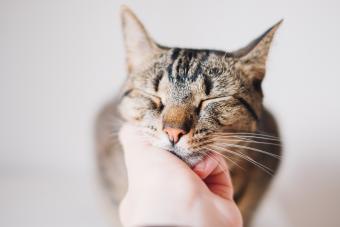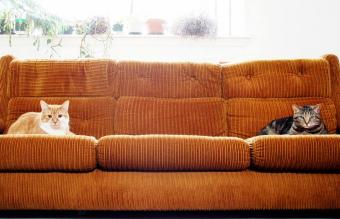
Cats can be hard to read, so you may wonder how you can tell if your kitty is stressed out. The signs of stress in cats can be pretty subtle. Your cat might begin eating less, hiding occasionally, or licking their belly more often than usual. However, there are also more noticeable signs. If you see signs your cat is stressed out, be ready to take action to help calm your anxious kitty and make them feel better.
8 Common Signs of Stress in Cats
Watch for these indicators your cat is stressin'. Several signs, some more obvious than others, will tell the tale.
- Hiding: When someone comes over, does your cat disappear?
- Overgrooming: All cats groom themselves - we're talking about way overdoing it
- Excessive meowing: If your cat just won't stop, they might be stressed
- Eating less or more than usual: Watch for changes in how much your cat eats
- Urinating or defecating outside the litter box: Your cat might be acting out here
- Stomach upset: It can be hard to tell, but a cat with a sour stomach might be anxious
- Aggression toward people or pets: Sudden aggression in a normally calm cat is a red flag
- Changes in sleeping habits: Most cats sleep a lot, so watch for weird changes in their pattern
1. Hiding
Stressed-out cats tend to withdraw. You might notice them hiding more than usual. If they feel threatened by a housemate, they'll often retreat to a safe place, like under the bed, or they may even sit in the litter box. The key is to watch for changes in behavior here. If your cat is fine, but when a new visitor drops in they disappear, this might mean they're stressed.
2. Overgrooming
Cats spend a lot of time "bathing" themselves, but too much self-grooming can be a symptom of stress in cats. Experts believe licking triggers the release of endorphins, so cats may do it in times of stress as a self-soothing technique. Compulsive licking or chewing can cause bald patches, particularly on the belly and inside of the back legs.
3. Excessive Meowing
Some cats may become more vocal when they're stressed. Meows are one of the many cat sounds that cats use solely when communicating with humans, so if your cat suddenly starts meowing nonstop, they might be trying to tell you they're under stress.
4. Increased or Decreased Appetite
Just as in humans, stress can affect a cat's appetite. They may stop eating or overeat in response to anxiety. Along with changes in appetite, you may notice weight loss or gain.
5. Changes in Litter Box Habits
Is your cat urinating or defecating outside of the litter box? It could be due to stress. Cats can spray urine around the house (even on your bed!) because they're under stress. If a cat is too frightened to make their way to the litter box for fear they'll be attacked by a housemate or because they're stressed out by a new smell in the room, they may do their business elsewhere instead.
6. Stomach Issues
Stress can have a direct effect on the gastrointestinal system, so it's not uncommon for cats to develop diarrhea, vomiting, or even constipation if they're stressed out.
7. Aggression
Aggression toward a new pet or person in the house could point to stress. If a cat is stressed out, they may also turn on humans or pets they once had a good relationship with. Instead of cuddling with a housemate, they could suddenly growl or hiss whenever they see them.
8. Changes in Sleeping Habits
Sleeping more or less than usual is a common sign of stress in cats, as well as changes in sleeping location. A cat may stop sleeping with a housemate or might suddenly begin sleeping on your head in response to stress.
What Causes Stress in Cats?
Most pet cats sleep an average of 12 to 18 hours a day and have meals delivered straight to their food dish, so what do they have to be stressed about? Unfortunately, cats are more sensitive than most other pets, particularly when it comes to changes to their environment or lifestyle. Even small adjustments can disrupt their flow.
- Changes to their environment (moving furniture, switching cat litter type, etc.)
- Introduction of new pets to the home
- New people in the home
- Illness or injury
- Loss of a housemate
- Moving
- Changes to routine
- Trips to the vet
- Lack of enrichment
- Loud noises
- Strong smells
Chronic stress can affect your cat's quality of life and even lead to illness. Preventing or addressing feline stress early on is the best way to keep your cat healthy.
How to Address Feline Stress
It can be challenging to address stress in cats because you may never know the exact cause of the stress. Odrwn, many causes are unavoidable, like a trip to the vet, moving, or welcoming a new baby to the home. However, you can take steps to help calm your cat if they exhibit any signs of stress.
- Consider feline pheromones. Feline pheromones like Feliway can help create a calming environment for cats. They have special formulas designed for multi-cat households or feline scratching.
- Create a safe zone. Everyone needs a safe, comforting oasis, including your cat. Create a place just for them where they can retreat whenever they feel stressed. This could be a cozy crate or an elevated perch.
- Ensure all pets in the household have enough space. If you have more than one cat or other pets, make sure they aren't too cramped.
- Add enrichment. Keep your cat mentally stimulated by playing fun games that use all their senses. Petting your cat is also a form of enrichment, so you can turn up the TLC too!
- Head to the vet. An exam by your veterinarian can help rule out any physical causes of stress, like illness or injury. It can also help identify any physical conditions that could be a result of their stress.
Help Your Cat Feel Calm and Stress-free
If your cat is showing any common signs of stress, there could be a number of things going on. If you're able to identify what could have triggered their anxiety, you may be able to rewind and slowly ease your cat into the situation without stressing them out. However, stress can snowball into more serious conditions, particularly if your cat stops eating or becomes constipated. Work with your vet to make sure your cat is healthy and address their stress head-on.







